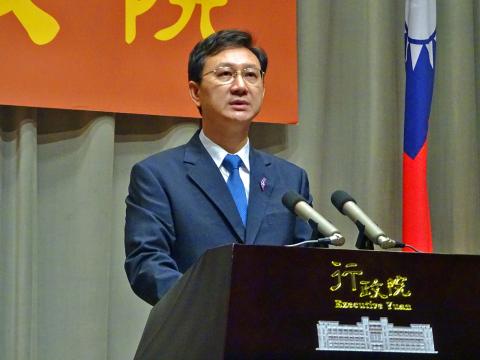Executive Yuan spokesman Tung Chen-yuan (童振源) said he would be available to journalists 24 hours a day after he was criticized for saying that he would only answer media queries through the Cabinet’s media group on the social networking app Line and urging reporters not to raise questions elsewhere to protect his quality of life and ease his workload.
“To avoid [media outlets] from making a scoop, to lower my workload and maintain my quality of life, I will no longer answer queries from media outlets individually. If you have any questions, please raise it in our Line group for the media. I will answer them to be fair to everyone else,” Tung said in a statement sent at 11:10pm on Saturday via the Executive Yuan’s official Line group for the media.
“I hope this model would work better for all and if you have a better suggestion, you can raise it here and we can discuss it,” he wrote.

Photo: Lee Hsin-fang, Taipei Times
The statement triggered uproar among journalists, with many reporting the story as breaking news.
“If a government spokesperson would only answer questions via Line, why is he getting paid so much?” a newspaper reporter surnamed Chen (陳) said.
“He can ask [reporters] not to disturb him after a certain hour at night, but how can he not want to answer individual telephone calls during working hours? This has nothing to do with quality of life, it is him having bad quality of work,” Chen said.
“If [Tung] needs a break, he can find a deputy to rotate with him, is that hard? Members of the media rotate shifts too,” a TV reporter surnamed Tsai (蔡) said. “Moreover, if something big happened, would he just ignore it for his quality of life?”
Tung yesterday defended his remarks, saying that he merely wanted to explore different ways of interacting with members of the media, adding that some media outlets took his statement out of context.
He said he has discussed the issue with a number of reporters and understood the way they work, adding that he would keep the original lines of communication open by keeping his mobile phone switched on 24 hours a day.

Chinese spouse and influencer Guan Guan’s (關關) residency permit has been revoked for repeatedly posting pro-China videos that threaten national security, the National Immigration Agency confirmed today. Guan Guan has said many controversial statements in her videos posted to Douyin (抖音), including “the red flag will soon be painted all over Taiwan” and “Taiwan is an inseparable part of China,” and expressing hope for expedited reunification. The agency last year received multiple reports alleging that Guan Guan had advocated for armed reunification. After verifying the reports, the agency last month issued a notice requiring her to appear and explain her actions. Guan

GIVE AND TAKE: Blood demand continues to rise each year, while fewer young donors are available due to the nation’s falling birthrate, a doctor said Blood donors can redeem points earned from donations to obtain limited edition Formosan black bear travel mugs, the Kaohsiung Blood Center said yesterday, as it announced a goal of stocking 20,000 units of blood prior to the Lunar New Year. The last month of the lunar year is National Blood Donation Month, when local centers seek to stockpile blood for use during the Lunar New Year holiday. The blood demand in southern Taiwan — including Tainan and Kaohsiung, as well as Chiayi, Pingtung, Penghu and Taitung counties — is about 2,000 units per day, the center said. The donation campaign aims to boost

The Kaohsiung Tourism Bureau audited six hotels in an effort to prevent price gouging ahead of Korean band BTS’ concert tour in the city scheduled for Nov. 19, 21 and 22 this year. The bureau on Friday said that the audits — conducted in response to allegations of unfair pricing posted on social media — found no wrongdoing. These establishments included the local branches of Chateau de Chine, Hotel Nikko, My Humble House, and Grand Hai Lai, it said, adding that the Consumer Protection Commission would have penalized price gougers had the accusations been substantiated. The bureau said the Tourism Development Act

The Central Weather Administration (CWA) said a magnitude 4.9 earthquake that struck off the coast of eastern Taiwan yesterday was an independent event and part of a stress-adjustment process. The earthquake occurred at 4:47pm, with its epicenter at sea about 45.4km south of Yilan County Hall at a depth of 5.9km, the CWA said. The quake's intensity, which gauges the actual effects of a temblor, was highest in several townships in Yilan and neighboring Hualien County, where it measured 4 on Taiwan's seven-tier intensity scale, the CWA said. Lin Po-yu (林柏佑), a division chief at the CWA's Seismological Center, told a news conference